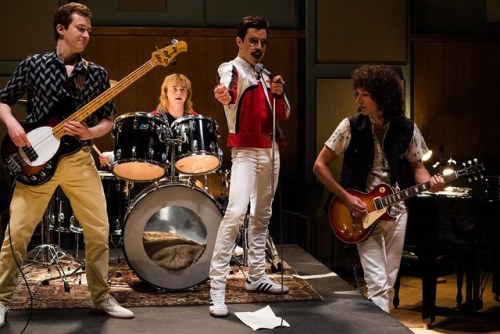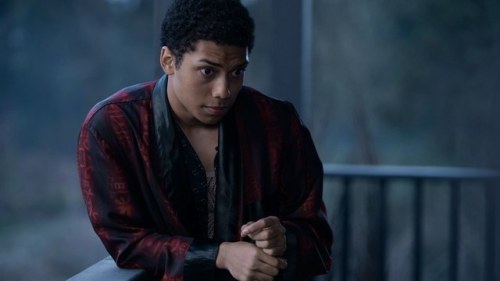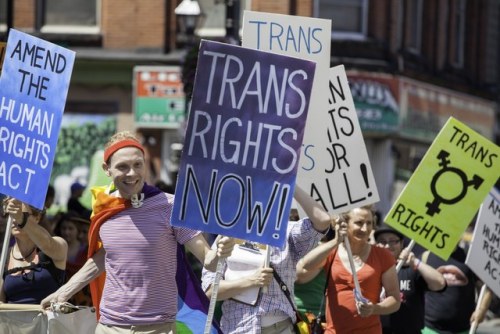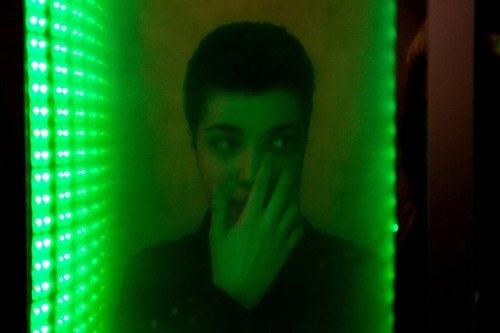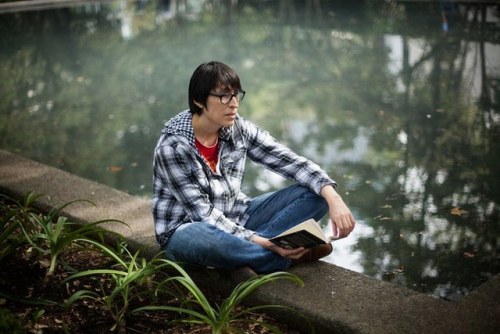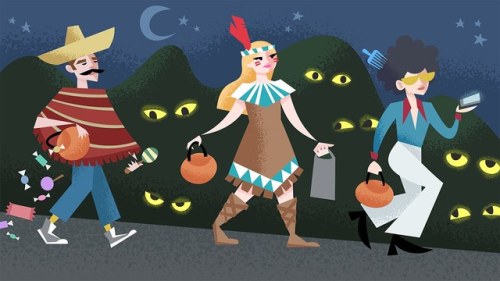#themus
Bohemian Rhapsody’s Queer Representation Is Downright Dangerous
Bohemian Rhapsody opens with Queen’s 1976 hit “Somebody to Love,” unsubtly blazoning Freddie Mercury’s quest for companionship as its central dilemma, alongside the meteoric rise of the band that made him an icon. “Can anybody find me somebody to love?” Freddie (played by Rami Malek) pleads as the camera pans over his shoulder in a flash-forward to the Live Aid performance that crystalized Queen’s place among the world’s greatest rockers.
The frontman biopic, in theaters November 2, far from ignores the singer’s alleged bisexuality, as feared it might when the first trailer was released this spring. (While Mercury was known to have relationships with both men and women, he strongly resisted commenting publicly on his private life.) But director Bryan Singer’s characterization of Mercury’s sexuality has little, if anything, to do with sex. In fact, there is not a single sex scene in the film’s drawn-out runtime — a startling omission given Mercury’s storied sexual appetite, and even despite the movie’s PG-13 rating. (Plus, this is supposed to be about rock ’n’ roll, remember?)
Rather,Rhapsody seizes on its protagonist’s sexuality as the root of a dual and destructive nature; a pivot around which to construct its narrative of competing, and ultimately irreconcilable, desires. Singer casts Mercury’s psychosexual imagination as a tug-of-war between convention and perversion, love and lust, security and dissolution. Such representation isn’t just cliche and dangerously reductive in its vilification of homosexual desire and implicit invalidation of bisexual identity. It also renders a flesh-and-blood pioneer of genderqueer glam rock with a richly erotic psyche as a hollow and false totem of the perils of fame.
Any film about a queer celebrity, set even in the recent past, has an obligation to contextualize how a star’s queerness was expressed and received during less tolerant times. But it’s not Bohemian Rhapsody’s historical context that demonizes Mercury’s same-sex attraction — it’s the camera itself.
Mercury’s conservative Parsi-Indian background and the rock scene’s heteronormative fan appeal were doubly stacked against him. But Bohemian Rhapsody is only mildly concerned with potential fallout from mom and dad (played by Meneka Das and Ace Bhatti) — stereotypes of South Asian immigrant parents if I’ve ever seen them. They wring their hands when their son abandons his birth name, Farrokh Bulsara, to fully adopt his stage moniker. Mr. Bulsara is briefly shown reading tabloid headlines about his son’s backroom dalliances with men, and keeping the paper from Freddie’s mother. A resolutory scene that finds them quietly accepting Jim Hutton (Aaron McCusker), who would go on to be Mercury’s lifelong partner, as a “friend” Freddie brings home for tea is so pat as to feel absurd.
Post link
Magic: The Gathering’s Canonically Trans Character Is Changing the Game for Trans People
“Greet death with sword in hand.” That’s the flavor text on the card Alesha, Who Smiles at Death, a legendary creature from the card game Magic: The Gathering — and if this sentence is already too nerdy for you to handle, buckle up.
Alesha was printed more than three years ago as part of the game’s Fate Reforged expansion, and she’s maintained her fan popularity over time thanks largely to one major distinction: She’s the first canonically transgender character in the game’s 25-year history. Though many trans players have flocked to Alesha’s macabrely beautiful representation, Gamergate holdouts and other reactionaries still regard her and real-life trans people with hostility. And as Magic publisher Wizards of the Coast (WotC) moves to dominate online card games with their newly-launched Arena platform, it’s still unclear how welcome — or safe — trans players are in one of gaming’s oldest fandoms.
In all honesty, I stumbled onto this myself by sheer coincidence. I began playing Magic back in 1997, when the expansion Tempest had just been released, and instantly became hooked. Everything about it appealed to me: the competitive, ever-shifting gameplay; the social aspects of trading and bartering; and particularly the lore, packed full of complicated characters that grew with every set. But while I had plenty of opportunities to play with my friends in high school, college proved to be less receptive, and I drifted away from the game for a number of years as I graduated, figured out I was a girl, and tried to get my life together. Sure, I played a few games here and there, but I stopped considering myself a “Magic player” until recently.
A few months ago, I traveled back to my hometown for my high school reunion. (My trans friends sometimes express surprise that I wanted to attend; to be frank, you couldn’t have paid me not to go and flaunt how cute I am now.) Late in the evening, I mentioned to one of my oldest friends that I’d been thinking about getting back into Magic. Her eyes brightened: “Oh, I’ve got a bunch of those lying around,” she told me. “Do you want them?”
Flabbergasted, I accepted. I had no idea my friend had ever even touched a Magic card, and I’d known her since the fourth grade. But this wasn’t the only surprise awaiting me. Rifling through the cards on my long bus ride home, I gasped inwardly as I stumbled across her: Alesha, Who Smiles at Death. Even after being out of the game for nearly a decade, I had heard of her and who she was. Clearly, this was a sign that my old beloved hobby was calling for my return, and I was only too happy to oblige.
Post link
Have No Fear, Scorpio Season Is Here! Wait, Sorry. My Mistake. Fear Scorpio Season.
The sign of the Scorpio, in many ways, is about death — and therefore, it is just as much about life. With the new moon in Scorpio on November 7, the universe will be asking you to consider spiritual death and rebirth. What has been holding you back this year? Are there things you can let go of that have been weighing you down? Venus goes direct on November 16, bringing a certain emotional release when it comes to romance and love, but Mercury will go retrograde on the same day, forcing us to take action regarding the lessons we’ve learned over the past few weeks. Use this time wisely, and resist falling into old patterns. In order to survive Scorpio season, we must listen to the signs of our souls. Pay attention to the darkness. — F.R.
Post link
¡Hola Papi! Am I Expecting Too Much Out of Casual Hookups?
Welcome to ¡Hola Papi!, the preeminent advice column by John Paul Brammer, a Twitter-addled gay Mexican with chronic anxiety who thinks he can fix your life. If you’re a queer person facing a dilemma — maybe you’re thinking about dumping your partner (they forgot your birthday), fighting with your roommate (they never pitch in for groceries), or being haunted by a gay ghost in your attic (the screams won’t stop and the cleansing ritual has failed) — we’ve got you covered.
If you need advice, send him a question at [email protected]. Be sure to begin your letter with “Hola Papi!” It’s part of the whole deal.
Hola Papi!
I’m a chronically single bottom. I like casual sex, and while there’s weirdly not a huge gay casual sex scene in my city, I get by just fine meeting men on FetLife. I like being alone and belonging only to myself, and I like to keep my relationships casual. But here’s the thing: A lot of men seem to read “casual” as “one night stand.”
When the sex is exceptionally good, I can’t help but yearn to see a man again and again. Am I desperate for wanting to hook up again after a casual hookup? And if I enjoy casual sex so much, why isn’t a one-time mind-blowing session enough for me? Please help!
Love,
Bored Bottom
Hello, Bored Bottom!
I must admit, your question has stuck with me for the past week or so. I think it’s because I consider myself, if not a sex addict, then someone who thinks about sex too much for his own liking. Not that thinking about sex is inherently bad or anything — it’s just that I could be thinking about literally anything else. What would I rather think about? I’m not sure. My brain is too addled by sex.
Anyway, I have spent countless hours looking for sex — labor that absolutely does not square with the limited rewards. Occasionally, the sex is good. Most often, it is forgettable. Sometimes, it is terrible. I’m getting pretty tired of walking up some decrepit staircase in a weird apartment building, knees knocking, wondering if I am going to be murdered or merely disappointed. Sometimes I stop and think: What rational explanation is there for this behavior?
If I had to guess, Bored Bottom, “yearning” would be the culprit in both our dilemmas. It’s the proverbial carrot on the proverbial stick; the engine of wasteful, whimsical activity, like waiting around and hoping (amidst a sea of feedback that cautions us otherwise) that the ideal hookup will finally happen and launch us into an ideal situation with an ideal person. This isn’t restricted to sex and romance, by the way. People experience this in the realms of work and friendship, too. Yearning doesn’t discriminate.
Bored Bottom, do you ever wonder if the universe gives us just enough to keep us hoping for more? I believe it does! Because every once in a while, right when I’m about to give up on my Quixotic quest for the perfect Grindr hookup, one happens. Kind of. More like it halfway happens, which tells me the possibility of it all-the-way-happening exists, and so I continue. But this probably isn’t the universe’s doing. Only our own brains could fool us so utterly and completely.
Post link
How LGBTQ+ Voters Can Make an Impact on the U.S. Political Landscape
Under the Trump administration, LGBTQ+ rights and legal protections are being threatened on a daily basis. It’s a scary time, but we’re committed to making change — and we know we’re capable of doing so. To educate queer voters during this midterm election season and ensure that our community is fully informed on politicians, policies, and procedures, them. has collaborated with Google to create our Queer the Votepackage.
Queer the Vote shows a state-by-state summary of LGBTQ+ legal protections (including the LGBTQ+ population density of each state, as well as which states have housing and employment nondiscrimination protections in place), plus a voter guide with an overview of candidates listed on each state’s ballot, and those politicians’ LGBTQ-friendliness ratings. Gabriel Arana, who worked on creating and building the Queer the Vote package, reminds us that “it can be difficult for individual voters to feel as though their vote matters, but the future of the country often hinges on a handful of votes in key states.”
In this week’s episode of The Library, a them. roundtable on LGBTQ+ news and culture, Arana joins Teen Vogue Executive Editor Samhita Mukhopadhyay and News and Politics News Editor Lucy Diavolo, as well as Voices4 founder Adam Eli to discuss the midterms and Queer the Vote. “When you are voting, you’re not just voting for your rights or the rights of your friends — you’re voting for the rights of queer people all over the world,” says Eli. To learn more about how to vote in your state, and policies affecting LGBTQ+ people nationwide, check out the full episode above and the Queer the Vote package here.
Post link
How a Gay Couple On a Netflix Show Stole My Heart
Warning: Spoilers for the first season of Netflix’sÉliteahead.
If you know me (or follow me on Twitter), chances are you’ve already heard me sing the praises of Élite. Netflix’s new Spanish-language series follows three working-class students who are given scholarships to Las Encinas, an elite private prep school in Spain, after their own school collapses — only to find themselves caught in a murder investigation when one of their peers turns up dead.
In the two weeks since it premiered, I’ve tried to turn everyone I can onto the show, even going as far as to personalize my recommendations for each person. I describe it as a “deliciously catty show about wealthy teens” to Gossip Girl fans, as a “drool-worthy stash of real estate porn” for those who loved Big Little Lies, and as an “engrossing murder mystery” for those who like the time-hopping structure of procedurals like How to Get Away With Murder.
But no matter who I’m talking to, I always stress one particular factor (two, rather): Omar and Ander, two (unspeakablyattractive) gay characters who, over the course of the season, somehow find a way to be together despite everything pulling them apart.
As the series’ defining queer relationship, it’s not saying much that Omar and Ander’s love affair stood out to me the most. (After all, I am a gay man.) But it wasn’t just the fact that Omar and Ander were gay that drew me into their orbit. Their relationship was always more than just that, in and of itself — it also opened up discussions about class difference, racism, and religious dogma. It was one of the show’s most emotionally impactful stories.
Élite is notable for dealing with gay intimacy in a frank, realistic way — particularly when compared to other high school shows (perhaps aside from Riverdale, whose impressive exploration of gay cruising culture in the show’s second season deserves mention) — allowing Omar and Ander to have real sex and, more importantly, show the act as something explicitly sexy. It’s one of many reasons Omar and Ander are my favorite television couple of the year.
But beyond that, much of Omar and Ander’s appeal stems from their being two of the most sympathetic characters in a show full of incredibly unsympathetic people. Though initially introduced as part of a group of elitist Las Encinas rich kids intent on belittling the school’s transfer students, Ander, a budding tennis champion, is quickly established as one of the nice ones. In early scenes, he noticeably refrains from engaging in his friend group’s threatening taunts, and even helps to de-escalate some of the more potentially volatile arguments that break out between his friends and new students. It’s later revealed that Ander isn’t filthy rich like most of his peers. Rather, he’s at Las Encinas as the son of the school’s principal. Plus, his father has big plans for his future as a tennis star, even though Ander finds himself losing interest in the sport completely.
Post link
Am I “Trans Enough” to Take Hormones?
I’ve been dysphoric about my body since the moment my sixth grade health teacher told me my hips and chest would grow with puberty. I cried inconsolably that afternoon and spent the next few weeks desperately searching for a solution; a way to cheat adolescence and maintain my androgynous form. I broke down in an anxious heap, terrified at the prospect of growing up to become a woman, and started praying to God to never let me grow boobs.
10 years later, I sat in a doctor’s office, waiting on a different powerful being to help answer the prayers that God never did. After years spent desiring a more masculine form, I knew that I wanted to finally seek out hormone replacement therapy (HRT) to help ease the gnawing feeling of being mismatched with my own body.
But I felt like a complete fraud for doing it.
When I came out as nonbinary, I worried constantly that I wasn’t “trans enough” to warrant starting testosterone. That fear was amplified the first time I researched the process of medical transition; everything I found online was a one-way, no-turning-back formula: You could be either a trans woman or a trans man. There was no space for someone like me.
Reading about trans men’s experiences with testosterone, I felt like a spy collecting research on someone else’s territory. It seemed like everyone’s experiences were focused on the ultimate goal of presenting as a man in public. Effects of testosterone, like beard growth and baritone-level voice drops, were laid out like landmarks only to be celebrated as part of a straightforward journey to manhood. As my self-confidence splintered, my Google search history quickly morphed from “What is testosterone?” into “Am even I allowed to take testosterone?”
On my own, I struggled with whether or not HRT was right for me and my dysphoria. Though I didn’t find my experience reflected online, I knew that because my own goal was to transition to appear more androgynous, there were some changes I wanted with testosterone and others that I did not. I found community in the shared desire for body fat redistribution and the masculinization of my facial structure, but I felt my stomach drop in panic and isolation as I scrolled through photos of trans men celebrating their facial hair growth. When I read through checklists of the physical changes testosterone causes, I darted between excitement and panic. Then I read the line at the bottom of every web page: “You cannot pick and choose the changes that you want when you start testosterone.”
Post link
Chance Perdomo Has a Lot to Say About His Pansexual Character on Sabrina
In 1996, with beloved Nickelodeon series Clarissa Explains It All already under her belt, Melissa Joan Hart saw her fame skyrocket even further as the titular character in the ABC hit series Sabrina the Teenage Witch. The show ran until 2003, and has been sorely missed by many since. Thankfully, on October 26, Sabrina will return to our screens in a reboot — this time, starring Mad Men’s Kiernan Shipka.
Netflix’s Chilling Adventures of Sabrina is a darker spin on the ‘90s classic, including tales of murder, mystery, and necromancy. Several characters from the original series are back in this reboot, including Zelda, Hilda, and Salem, but a major new addition to the world of Sabrina is Ambrose Spellman — Sabrina’s pansexual cousin who begins the series under house arrest. Ambrose, played by actor Chance Perdomo, is a gifted necromancer and faithful member of the Spellman family who always has Sabrina’s best interests at heart. We sat down with Perdomo to discuss the new series, his character’s pansexuality, and his future goals.
It’s been quite a cool process. We take horror elements we didn’t necessarily see in the classic Sabrina. At the same time, we harken back to the original series with some the familiar elements. Like my character Ambrose, as tortured as he is living under house arrest, he is a loving, warm individual and family comes first for him, always. Whenever Sabrina gets into trouble, she always goes back to her family. Aunt Hilda and Zelda will do whatever they can to protect her. Well, Zelda protects the Spellman name, but they both protect the Spellman family. Mix in a bit of Buffy the Vampire Slayer, True Blood, and the creators of Riverdale, and you’ve got a sexy, funny, scary, smorgasbord that really works. As an actor, you watch things back with gritted teeth and you’re biting your nails, but this is the first thing I’ve seen where I’m not seeing myself. Like everyone else, I’m immersed in it despite knowing everyone in it. From that perspective, I say it works.
It’s freeing. Excuse my French, but it’s not like that typical teen shit. It’s not white, heartthrob, shirtless, laying down in the woods, goes hunting to bring back a pelt skin — that story we’ve seen over and over again. It’s freeing to be able to play more accurate representation. Netflix is a global brand, so they cater to their global audience, which means accurate representation of people as they exist. That’s not all white male hunks running around to save the princess. We have what would’ve been the princess as a strong, independent female character. Ambrose, being the Alfred to her Batman, is pansexual and what we call in the Western world, an ethnic minority. So being pansexual and an ethnic minority is a narrative we haven’t necessarily seen played out on TV with depth. You can kind of go, Oh he’s this, he’s that, buzzword, buzzword, ta-da! Sabrina presents each character as they are in the world — multifaceted individuals. Ambrose specifying that he’s pansexual is important to his story arc. We don’t waste time or make a big fuss about it to the audience. We drop you into it. They’re not telling you Ambrose. They’re showing you Ambrose. There’s not as much information out there regarding pansexuality as there is about other parts of the LGBTQ+ community. I think maybe that’s why they had to specify in the beginning for audiences that aren’t as necessarily aware.
Post link
This 61-Year-Old Trans Woman Lost Her Job After Coming Out
Trans in America, a series of short documentaries produced by the ACLU and Little by Little Films, has a simple aim: to bridge the gap between trans visibility and trans rights in the United States. Through these portraits of three trans Americans, we gain a sense of the enormity of the struggle required to simply exist as a trans person in our country, whether as a six-year-old girl in Texas whose future rights lay in the hands of discriminatory state politicians, or as a 29-year-old Chicago residentwho experiences targeted violence as a Black trans woman.
In this third and final chapter, we meet Jennifer Chavez, a Georgia resident who transitioned at age 51. She has been a master auto repair technician for decades, with a thriving career stemming from her lifelong passion for cars. That passion helped her bond with her son throughout his life, but after Chavez transitioned, the two became estranged. Her transition also resulted in the loss of her job, despite her supervisors claiming she was the best technician the company had.
Chavez’s story is all too common: Across the country, trans people risk unemployment, workplace harassment, and prejudice from family and friends when they come out. Chavez, now 61, is no stranger to this plight, having worked a number of odd jobs since transitioning to make ends meet. In this short film, Chavez also explains how she deals with issues that are rarely discussed in-depth in mainstream media, yet highlight how much harder many trans folks have to work to get by.
Post link
Call Your Senator About Trans Rights — But Call Your Mom Too
On Sunday, news broke that the Trump Administration is working on policies that would define sex as “a person’s status as male or female based on immutable biological traits identifiable by or before birth.” Trans people had seen this infuriating news coming, what with Trump and the Republican party’s hostility toward the trans community. Still, nothing can truly prepare one for the next political move or anti-trans headline. Trans people continue to find that our darkest fears aren’t just abstract thoughts, but that this administration is actively working to strip trans people of our human rights and legal protections.
Recently, a person asked me how cis people can support trans women. My best advice is: be a friend. Give us the benefit of the doubt and give us a chance. Stop holding us at arms length and invite us into your club. Tell your trans friends you love them. Be the kind of friend I can turn to when the president and my country make me feel like dying. Perhaps most importantly, be the kind of friend who advocates for trans people and our human rights.
Almost all of us have people in our lives who are planning to vote Republican in the midterm elections, whether they’re family, coworkers, neighbors, teachers, or acquaintances. Spend time talking to them about the importance of trans rights. Be patient with them and have resources at the ready to answer questions. Look to the trans people you follow on social media to find articles written by trans people — especially explainer pieces, or personal stories. Find resources on how to talk to family and people who are unfamiliar with trans issues. This isn’t about arguing with assholes; it’s about communicating with the millions of people who aren’t aware that they’ve ever met a trans person.
Post link
Intersex Stories Need to Be Heard, And This Multimedia Project Is Amplifying Them
Intersex Awareness Day presents an opportunity to reflect on the intersex rights movement and the intersex community. While honest and empathetic conversations around being intersex have slowly grown in recent years, media representation is still all too rare.
My Own Wings is one project attempting to illuminate the authentic stories of intersex people. Organized by photographers Katia Repina and Carla Moral, My Own Wings brings together different testimonies from intersex people living around the world. These testimonies are bolstered via photos, interviews, a documentary film, and research on different social, medical, and legal issues involving the intersex community. Its creators’ aim is to enrich public dialogue surrounding gender identity and intersex human rights issues by amplifying the stories of intersex people.
Repina spoke with them. about the project, what it’s taught her and Moral over the last four years, and how they hope to spread awareness about intersex people and their life experiences.
: Katia Repina and Carla Moral
Post link
Why Your Halloween Costume Is Racist: A Handy Message for That Person You Know
You may think it’s an easy task to avoid committing a slew of race-based offenses against various communities while celebrating Halloween. And you’d be right! It’s not hard at all. But as 2018 has taught us, just because the bar is on the floor doesn’t mean a whole lot of people won’t find a way to trip over it.
So on the off chance that you’re reading this while hot gluing feathers to a headdress for your “Native American” costume, or know someone who is, here are a few tips on how to avoid being a jerk this Halloween, and sidestep the grim prospect of your racist party pics being dragged on social media from here to the afterlife.
Let’s start with the basics. Going to a Halloween party where your costume concept is merely “a non-white person” is bad! Dressing up as a Native American (that headdress I mentioned earlier — put the glue gun down!), a Mexican (moustache, serape) or a Black person (Blackface: don’t!) always relies on harmful tropes about real, living, breathing people for whom those stereotypes carry serious weight.
Take the “sexy Pocahontas” costume, for example. Native women still face some of the highest ratesof domestic violence and sexual assault of any marginalized group. And as far as Blackface is concerned, it has its roots in minstrel shows, which degraded Black people for white entertainment and helped solidify violent notions against Black people to keep them oppressed.
Still, some people don’t get what the big fuss is about when it comes to Blackface. I direct you to one Megyn Kelly, who on her morning show (which exists?) recently defended the use of Blackface thusly: “Because you do get in trouble if you are a white person who puts on Blackface on Halloween, or a Black person that puts on whiteface for Halloween. And back when I was a kid, that was OK, as long as you were dressing up as, like, a character.“
Yes, a lot of things were “OK” in the past, Megyn! That’s kind of the whole gist here. We don’t have to go very far back in history to see that Black people and people of color have suffered — and continue to suffer — from systemic injustice in this country. Jim Crow was once “OK” in the eyes of the law in the U.S., and so was slavery! As we try to right those wrongs, we move forward. In that endeavor, what was acceptable yesterday is, thankfully, not always acceptable today.
But that’s all in the past — why does it matter? you ask. Well, the thing is, it’s not the past. Let’s not even get into the fact that the past has an intimate impact on the present. Stereotypes against Black people still contribute to violence against Black people to this day, as well as injustices like housing and employment discrimination.
Post link


